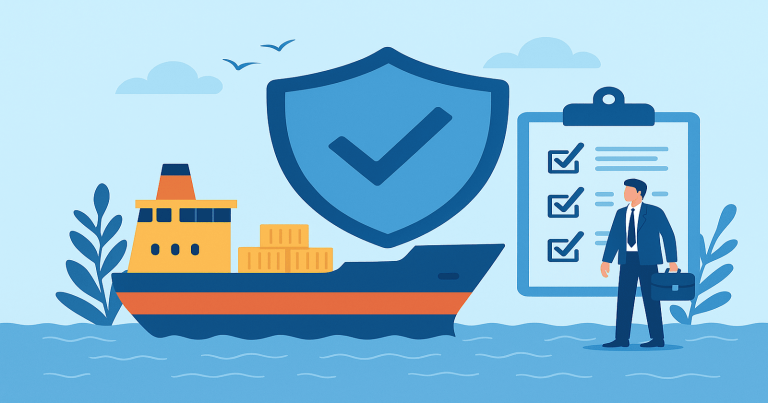Marine insurance protects goods, cargo, and ships during transport over water. It covers losses and damages from sea risks. When businesses or people move goods across seas or oceans, they face many dangers. Ships may sink, catch fire, or get damaged in storms. Goods may get lost or stolen. Marine insurance gives safety from these risks. It helps shipowners and traders recover their losses. Marine insurance began long ago when traders used ships to trade between countries. Today, it has become a large part of international trade. Marine insurance means a contract where the insurer agrees to protect the insured from marine-related losses. These can happen during loading, travel, or unloading. It gives peace of mind during trade.
Meaning of Marine Insurance
Marine insurance means an agreement between two parties. One party is the insurer. The other is the person or company who owns the goods or ship. The insurer promises to pay for loss or damage if anything bad happens at sea. This contract gives financial help to the insured. The insured pays a fee called a premium to get this safety.
Marine insurance covers all movements on water. It can also cover the time goods stay in storage before or after shipment. Marine insurance comes under the category of general insurance. It follows rules made by marine insurance laws. It plays an important role in sea trade.
Some important features of marine insurance are:
- It protects against sea dangers like storms, fire, and theft.
- It is based on a contract called a policy.
- It covers goods, ships, and cargo.
- It requires full truth by the insured.
- It applies from the time the goods start moving.
Marine insurance is necessary because sea transport has many risks. Without insurance, one big loss can break a business. Marine insurance avoids that. It makes trade safe and smooth.

Types of Marine Insurance
Marine insurance has many types. Each type gives safety for different needs. People can choose based on what they want to cover. Below are the main types.
1. Hull Insurance
Hull insurance covers the ship or vessel. It gives protection to the body of the ship. It also includes equipment used in the ship. If the ship hits rocks or faces a sea accident, hull insurance helps.
This insurance is useful for shipowners. It protects their main asset. Hull insurance is taken for commercial ships, fishing boats, and other vessels. It does not cover cargo or goods.
2. Cargo Insurance
Cargo insurance covers goods carried by ship. It protects importers and exporters from loss or damage to cargo. If a ship sinks or catches fire, cargo insurance pays for the goods lost. This insurance helps traders.
There are sub-types of cargo insurance:
- Open policy: Covers many shipments over time.
- Specific policy: Covers one shipment.
- Contingency policy: Taken by sellers if buyers refuse insurance.
3. Freight Insurance
Freight insurance protects the freight or shipping charges. If goods are lost and freight is not paid, the company loses money. Freight insurance covers this loss. It is useful for shipping companies.
4. Liability Insurance
Liability insurance protects shipowners from legal claims. These claims may come from third parties. For example, a ship may hit another ship. Liability insurance covers the damage cost.
Each type of marine insurance gives safety in a different way. Traders and shipowners choose based on their risk.
Principles of Marine Insurance
Marine insurance follows many basic rules. These rules help both parties stay fair and honest. Let us look at some main principles.
1. Principle of Utmost Good Faith
Both parties must tell the full truth. The insured must tell about all known risks. The insurer must explain the policy terms clearly. Hiding any fact can cancel the policy.
2. Principle of Insurable Interest
The insured must have interest in the goods or ship. That means, they must suffer loss if damage happens. Without this, insurance is not valid. For example, a trader who owns goods has insurable interest.
3. Principle of Indemnity
Insurance only pays for the actual loss. It does not give extra money. This avoids misuse. The aim is to bring the insured back to the same position as before the loss.
4. Principle of Contribution
If there are many policies for the same item, the insured cannot claim full amount from all. All insurers must pay their share.
5. Principle of Subrogation
After paying the claim, the insurer gets the right to claim recovery from third parties. This helps stop double gain.
These principles build trust and fairness. Marine insurance depends fully on them.
Benefits of Marine Insurance
Marine insurance offers many benefits to people and businesses. It gives security, support, and peace of mind in trading and shipping and is very important.
Key Benefits
- Financial Protection: It covers losses from damage, theft, or fire at sea. This saves the business from major loss.
- Trade Support: It helps import and export work without fear. Businesses can plan better.
- Risk Management: It reduces the fear of loss. This makes decisions easier.
- Legal Cover: It protects from third-party claims. Legal help comes with liability insurance.
- Customised Policies: People can choose cover as per need. Open or specific cargo policy gives flexibility.
Marine insurance also builds trust in international trade. Buyers and sellers feel safe. Banks give finance easily if cargo has insurance. Marine insurance supports business growth. It keeps the economy running smoothly.
Coverage and Exclusions
Marine insurance policies give coverage for many risks. But they also have limits. It is important to know what is included and what is not.
Common Coverage:
- Sinking or drowning of ship
- Fire or explosion
- Theft or piracy
- Stranding or grounding
- Collision between ships
- Natural disasters like storm or cyclone
Common Exclusions:
- War and nuclear risks
- Willful damage or misconduct
- Delay in delivery
- Improper packing
- Loss due to leakage
Every marine insurance policy clearly lists its coverage and exclusions. Reading them helps avoid confusion at the time of claim.
Documents Required for Marine Insurance
Many documents are needed to take and claim marine insurance. These documents prove ownership and support claims.
Important Documents:
- Insurance Policy: Shows details of cover, type, and premium.
- Bill of Lading: Acts as proof of shipment.
- Invoice: Tells value of goods.
- Packing List: Describes goods inside.
- Survey Report: Prepared in case of loss.
- Claim Form: Needed to apply for compensation.
These documents must be correct and complete. Incomplete documents can delay or reject the claim.
Laws Governing Marine Insurance in India
In India, marine insurance follows rules made under the Marine Insurance Act, 1963. This act explains the terms, rules, and claim process. Other laws like the Indian Contract Act also apply.
Main Points of the Act:
- Explains meaning of insurance, policy, and risk
- Lists duties of insurer and insured
- Covers indemnity, good faith, and claim process
- Applies to all Indian sea trade and shipping companies
This law ensures that marine insurance is fair and transparent. All insurers and insured must follow it.
Marine Insurance FAQs
Q1. What is marine insurance?
Marine insurance is a contract that protects goods, cargo, or ships from loss or damage during water transport.
Q2. What are the types of marine insurance?
Main types include hull insurance, cargo insurance, freight insurance, and liability insurance.
Q3. What is not covered in marine insurance?
Exclusions include war risks, delay, willful loss, and poor packing.
Q4. Why is marine insurance important?
It reduces financial risk and supports international trade with safety and legal support.
Q5. What documents are required for a marine insurance claim?
Documents like insurance policy, invoice, bill of lading, survey report, and claim form are needed.Meta Title – 59-75 characters

